Quantum Computing: Optimizing Machine Learning Algorithms for AI
VerifiedAdded on 2023/02/22
|6
|1499
|61
Project
AI Summary
This project proposal investigates the potential of quantum computing to enhance artificial intelligence (AI), focusing on optimizing machine learning algorithms, accelerating natural language processing, and improving data analysis. The project aims to design and implement a software tool that leverages quantum computing techniques to address scalability challenges in AI. It includes a literature review covering the applications of quantum computing in machine learning and natural language processing, as well as the challenges related to noise, error correction, and hardware limitations. The methodology involves a systematic review of literature, secondary analysis of academic journals, and primary analysis through the design and implementation of quantum machine learning algorithms. The project timeline outlines key tasks such as topic selection, aim and objective preparation, literature review, methodology selection, data collection, data analysis, and research completion. The goal is to evaluate the effectiveness of quantum computing in enhancing AI and to identify areas for further research and development. Desklib provides access to similar solved assignments and resources for students.

PROPOSAL
Student Name:
Student ID:
Student Name:
Student ID:
Paraphrase This Document
Need a fresh take? Get an instant paraphrase of this document with our AI Paraphraser
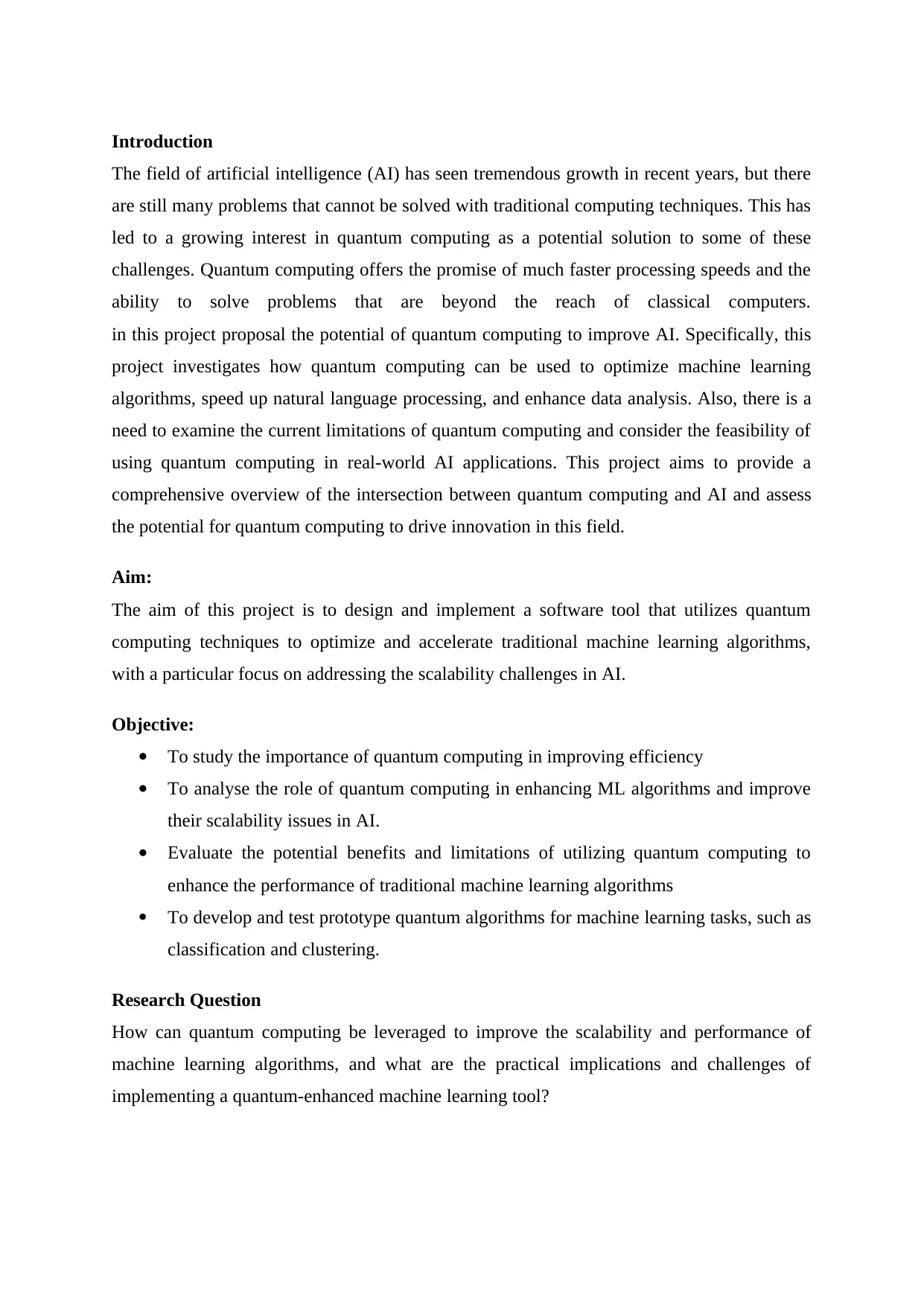
Introduction
The field of artificial intelligence (AI) has seen tremendous growth in recent years, but there
are still many problems that cannot be solved with traditional computing techniques. This has
led to a growing interest in quantum computing as a potential solution to some of these
challenges. Quantum computing offers the promise of much faster processing speeds and the
ability to solve problems that are beyond the reach of classical computers.
in this project proposal the potential of quantum computing to improve AI. Specifically, this
project investigates how quantum computing can be used to optimize machine learning
algorithms, speed up natural language processing, and enhance data analysis. Also, there is a
need to examine the current limitations of quantum computing and consider the feasibility of
using quantum computing in real-world AI applications. This project aims to provide a
comprehensive overview of the intersection between quantum computing and AI and assess
the potential for quantum computing to drive innovation in this field.
Aim:
The aim of this project is to design and implement a software tool that utilizes quantum
computing techniques to optimize and accelerate traditional machine learning algorithms,
with a particular focus on addressing the scalability challenges in AI.
Objective:
To study the importance of quantum computing in improving efficiency
To analyse the role of quantum computing in enhancing ML algorithms and improve
their scalability issues in AI.
Evaluate the potential benefits and limitations of utilizing quantum computing to
enhance the performance of traditional machine learning algorithms
To develop and test prototype quantum algorithms for machine learning tasks, such as
classification and clustering.
Research Question
How can quantum computing be leveraged to improve the scalability and performance of
machine learning algorithms, and what are the practical implications and challenges of
implementing a quantum-enhanced machine learning tool?
The field of artificial intelligence (AI) has seen tremendous growth in recent years, but there
are still many problems that cannot be solved with traditional computing techniques. This has
led to a growing interest in quantum computing as a potential solution to some of these
challenges. Quantum computing offers the promise of much faster processing speeds and the
ability to solve problems that are beyond the reach of classical computers.
in this project proposal the potential of quantum computing to improve AI. Specifically, this
project investigates how quantum computing can be used to optimize machine learning
algorithms, speed up natural language processing, and enhance data analysis. Also, there is a
need to examine the current limitations of quantum computing and consider the feasibility of
using quantum computing in real-world AI applications. This project aims to provide a
comprehensive overview of the intersection between quantum computing and AI and assess
the potential for quantum computing to drive innovation in this field.
Aim:
The aim of this project is to design and implement a software tool that utilizes quantum
computing techniques to optimize and accelerate traditional machine learning algorithms,
with a particular focus on addressing the scalability challenges in AI.
Objective:
To study the importance of quantum computing in improving efficiency
To analyse the role of quantum computing in enhancing ML algorithms and improve
their scalability issues in AI.
Evaluate the potential benefits and limitations of utilizing quantum computing to
enhance the performance of traditional machine learning algorithms
To develop and test prototype quantum algorithms for machine learning tasks, such as
classification and clustering.
Research Question
How can quantum computing be leveraged to improve the scalability and performance of
machine learning algorithms, and what are the practical implications and challenges of
implementing a quantum-enhanced machine learning tool?
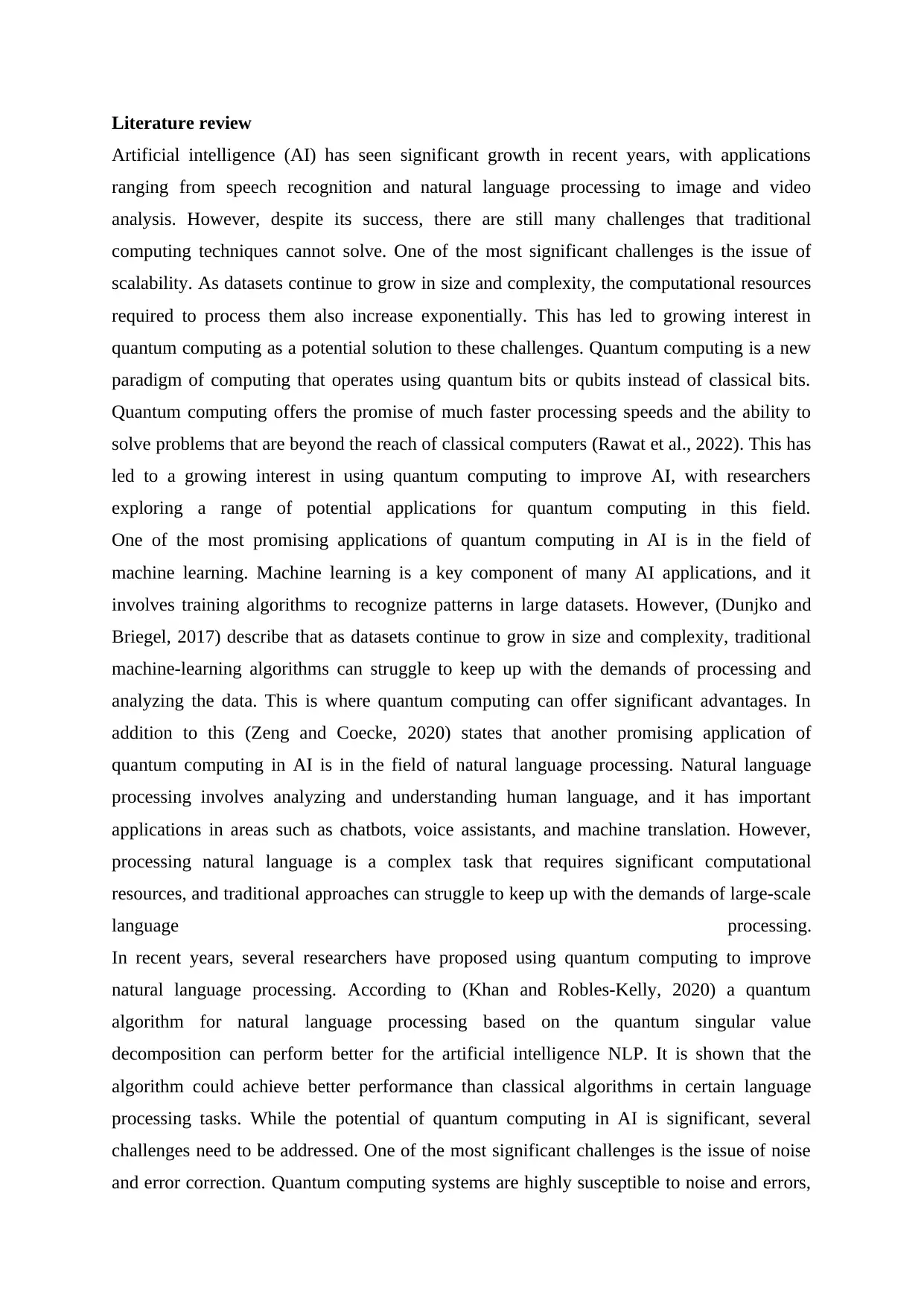
Literature review
Artificial intelligence (AI) has seen significant growth in recent years, with applications
ranging from speech recognition and natural language processing to image and video
analysis. However, despite its success, there are still many challenges that traditional
computing techniques cannot solve. One of the most significant challenges is the issue of
scalability. As datasets continue to grow in size and complexity, the computational resources
required to process them also increase exponentially. This has led to growing interest in
quantum computing as a potential solution to these challenges. Quantum computing is a new
paradigm of computing that operates using quantum bits or qubits instead of classical bits.
Quantum computing offers the promise of much faster processing speeds and the ability to
solve problems that are beyond the reach of classical computers (Rawat et al., 2022). This has
led to a growing interest in using quantum computing to improve AI, with researchers
exploring a range of potential applications for quantum computing in this field.
One of the most promising applications of quantum computing in AI is in the field of
machine learning. Machine learning is a key component of many AI applications, and it
involves training algorithms to recognize patterns in large datasets. However, (Dunjko and
Briegel, 2017) describe that as datasets continue to grow in size and complexity, traditional
machine-learning algorithms can struggle to keep up with the demands of processing and
analyzing the data. This is where quantum computing can offer significant advantages. In
addition to this (Zeng and Coecke, 2020) states that another promising application of
quantum computing in AI is in the field of natural language processing. Natural language
processing involves analyzing and understanding human language, and it has important
applications in areas such as chatbots, voice assistants, and machine translation. However,
processing natural language is a complex task that requires significant computational
resources, and traditional approaches can struggle to keep up with the demands of large-scale
language processing.
In recent years, several researchers have proposed using quantum computing to improve
natural language processing. According to (Khan and Robles-Kelly, 2020) a quantum
algorithm for natural language processing based on the quantum singular value
decomposition can perform better for the artificial intelligence NLP. It is shown that the
algorithm could achieve better performance than classical algorithms in certain language
processing tasks. While the potential of quantum computing in AI is significant, several
challenges need to be addressed. One of the most significant challenges is the issue of noise
and error correction. Quantum computing systems are highly susceptible to noise and errors,
Artificial intelligence (AI) has seen significant growth in recent years, with applications
ranging from speech recognition and natural language processing to image and video
analysis. However, despite its success, there are still many challenges that traditional
computing techniques cannot solve. One of the most significant challenges is the issue of
scalability. As datasets continue to grow in size and complexity, the computational resources
required to process them also increase exponentially. This has led to growing interest in
quantum computing as a potential solution to these challenges. Quantum computing is a new
paradigm of computing that operates using quantum bits or qubits instead of classical bits.
Quantum computing offers the promise of much faster processing speeds and the ability to
solve problems that are beyond the reach of classical computers (Rawat et al., 2022). This has
led to a growing interest in using quantum computing to improve AI, with researchers
exploring a range of potential applications for quantum computing in this field.
One of the most promising applications of quantum computing in AI is in the field of
machine learning. Machine learning is a key component of many AI applications, and it
involves training algorithms to recognize patterns in large datasets. However, (Dunjko and
Briegel, 2017) describe that as datasets continue to grow in size and complexity, traditional
machine-learning algorithms can struggle to keep up with the demands of processing and
analyzing the data. This is where quantum computing can offer significant advantages. In
addition to this (Zeng and Coecke, 2020) states that another promising application of
quantum computing in AI is in the field of natural language processing. Natural language
processing involves analyzing and understanding human language, and it has important
applications in areas such as chatbots, voice assistants, and machine translation. However,
processing natural language is a complex task that requires significant computational
resources, and traditional approaches can struggle to keep up with the demands of large-scale
language processing.
In recent years, several researchers have proposed using quantum computing to improve
natural language processing. According to (Khan and Robles-Kelly, 2020) a quantum
algorithm for natural language processing based on the quantum singular value
decomposition can perform better for the artificial intelligence NLP. It is shown that the
algorithm could achieve better performance than classical algorithms in certain language
processing tasks. While the potential of quantum computing in AI is significant, several
challenges need to be addressed. One of the most significant challenges is the issue of noise
and error correction. Quantum computing systems are highly susceptible to noise and errors,
⊘ This is a preview!⊘
Do you want full access?
Subscribe today to unlock all pages.

Trusted by 1+ million students worldwide
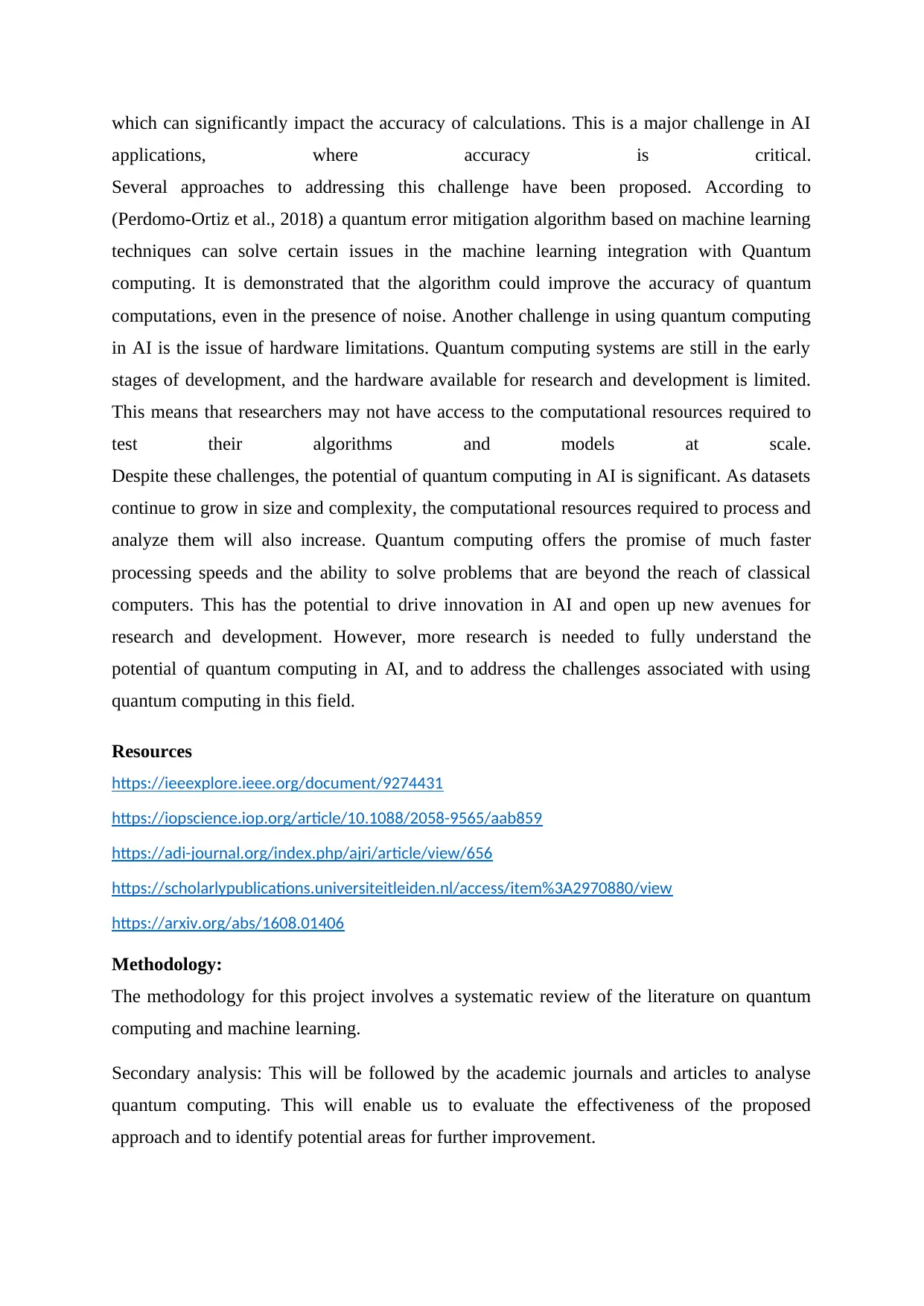
which can significantly impact the accuracy of calculations. This is a major challenge in AI
applications, where accuracy is critical.
Several approaches to addressing this challenge have been proposed. According to
(Perdomo-Ortiz et al., 2018) a quantum error mitigation algorithm based on machine learning
techniques can solve certain issues in the machine learning integration with Quantum
computing. It is demonstrated that the algorithm could improve the accuracy of quantum
computations, even in the presence of noise. Another challenge in using quantum computing
in AI is the issue of hardware limitations. Quantum computing systems are still in the early
stages of development, and the hardware available for research and development is limited.
This means that researchers may not have access to the computational resources required to
test their algorithms and models at scale.
Despite these challenges, the potential of quantum computing in AI is significant. As datasets
continue to grow in size and complexity, the computational resources required to process and
analyze them will also increase. Quantum computing offers the promise of much faster
processing speeds and the ability to solve problems that are beyond the reach of classical
computers. This has the potential to drive innovation in AI and open up new avenues for
research and development. However, more research is needed to fully understand the
potential of quantum computing in AI, and to address the challenges associated with using
quantum computing in this field.
Resources
https://ieeexplore.ieee.org/document/9274431
https://iopscience.iop.org/article/10.1088/2058-9565/aab859
https://adi-journal.org/index.php/ajri/article/view/656
https://scholarlypublications.universiteitleiden.nl/access/item%3A2970880/view
https://arxiv.org/abs/1608.01406
Methodology:
The methodology for this project involves a systematic review of the literature on quantum
computing and machine learning.
Secondary analysis: This will be followed by the academic journals and articles to analyse
quantum computing. This will enable us to evaluate the effectiveness of the proposed
approach and to identify potential areas for further improvement.
applications, where accuracy is critical.
Several approaches to addressing this challenge have been proposed. According to
(Perdomo-Ortiz et al., 2018) a quantum error mitigation algorithm based on machine learning
techniques can solve certain issues in the machine learning integration with Quantum
computing. It is demonstrated that the algorithm could improve the accuracy of quantum
computations, even in the presence of noise. Another challenge in using quantum computing
in AI is the issue of hardware limitations. Quantum computing systems are still in the early
stages of development, and the hardware available for research and development is limited.
This means that researchers may not have access to the computational resources required to
test their algorithms and models at scale.
Despite these challenges, the potential of quantum computing in AI is significant. As datasets
continue to grow in size and complexity, the computational resources required to process and
analyze them will also increase. Quantum computing offers the promise of much faster
processing speeds and the ability to solve problems that are beyond the reach of classical
computers. This has the potential to drive innovation in AI and open up new avenues for
research and development. However, more research is needed to fully understand the
potential of quantum computing in AI, and to address the challenges associated with using
quantum computing in this field.
Resources
https://ieeexplore.ieee.org/document/9274431
https://iopscience.iop.org/article/10.1088/2058-9565/aab859
https://adi-journal.org/index.php/ajri/article/view/656
https://scholarlypublications.universiteitleiden.nl/access/item%3A2970880/view
https://arxiv.org/abs/1608.01406
Methodology:
The methodology for this project involves a systematic review of the literature on quantum
computing and machine learning.
Secondary analysis: This will be followed by the academic journals and articles to analyse
quantum computing. This will enable us to evaluate the effectiveness of the proposed
approach and to identify potential areas for further improvement.
Paraphrase This Document
Need a fresh take? Get an instant paraphrase of this document with our AI Paraphraser
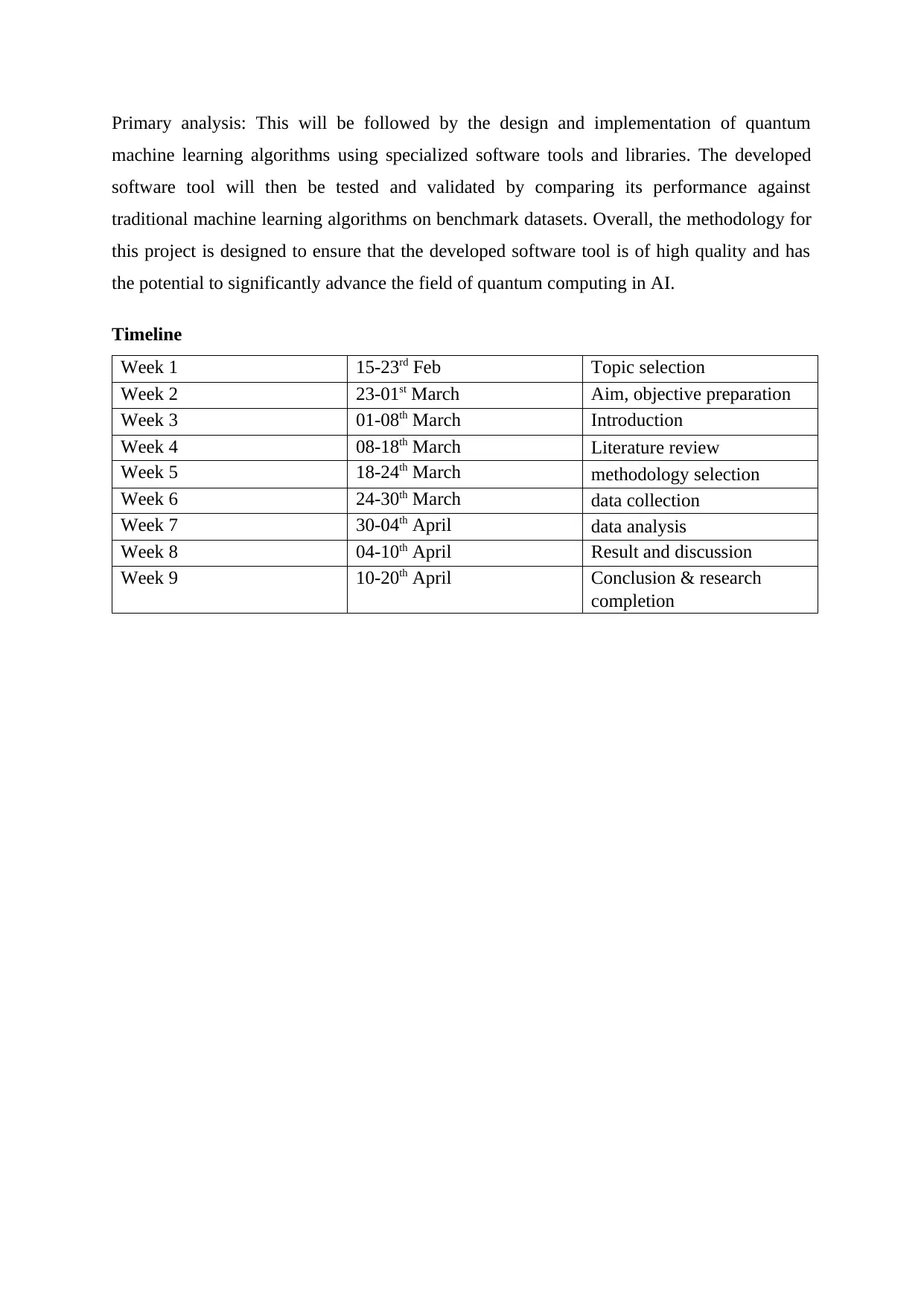
Primary analysis: This will be followed by the design and implementation of quantum
machine learning algorithms using specialized software tools and libraries. The developed
software tool will then be tested and validated by comparing its performance against
traditional machine learning algorithms on benchmark datasets. Overall, the methodology for
this project is designed to ensure that the developed software tool is of high quality and has
the potential to significantly advance the field of quantum computing in AI.
Timeline
Week 1 15-23rd Feb Topic selection
Week 2 23-01st March Aim, objective preparation
Week 3 01-08th March Introduction
Week 4 08-18th March Literature review
Week 5 18-24th March methodology selection
Week 6 24-30th March data collection
Week 7 30-04th April data analysis
Week 8 04-10th April Result and discussion
Week 9 10-20th April Conclusion & research
completion
machine learning algorithms using specialized software tools and libraries. The developed
software tool will then be tested and validated by comparing its performance against
traditional machine learning algorithms on benchmark datasets. Overall, the methodology for
this project is designed to ensure that the developed software tool is of high quality and has
the potential to significantly advance the field of quantum computing in AI.
Timeline
Week 1 15-23rd Feb Topic selection
Week 2 23-01st March Aim, objective preparation
Week 3 01-08th March Introduction
Week 4 08-18th March Literature review
Week 5 18-24th March methodology selection
Week 6 24-30th March data collection
Week 7 30-04th April data analysis
Week 8 04-10th April Result and discussion
Week 9 10-20th April Conclusion & research
completion
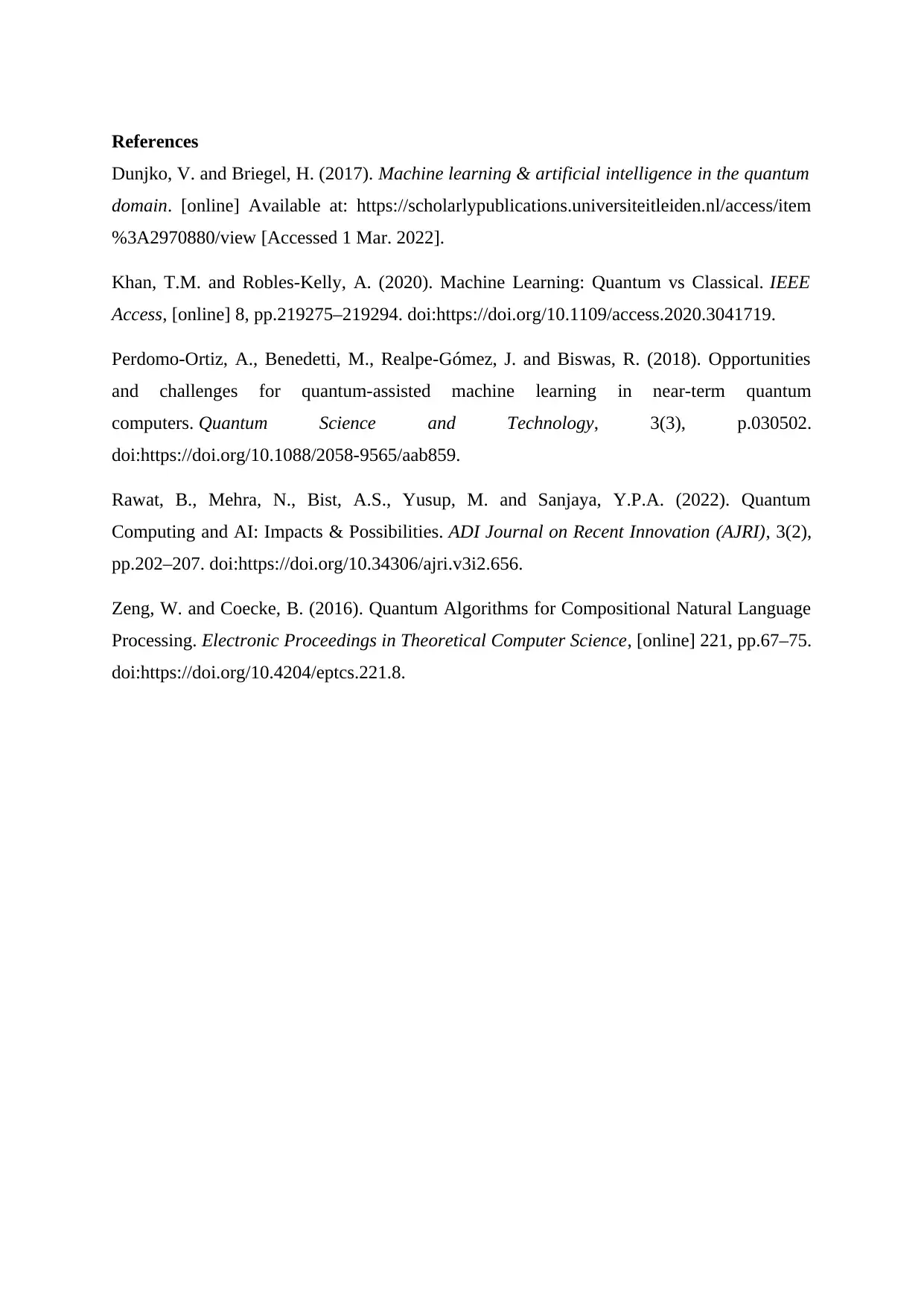
References
Dunjko, V. and Briegel, H. (2017). Machine learning & artificial intelligence in the quantum
domain. [online] Available at: https://scholarlypublications.universiteitleiden.nl/access/item
%3A2970880/view [Accessed 1 Mar. 2022].
Khan, T.M. and Robles-Kelly, A. (2020). Machine Learning: Quantum vs Classical. IEEE
Access, [online] 8, pp.219275–219294. doi:https://doi.org/10.1109/access.2020.3041719.
Perdomo-Ortiz, A., Benedetti, M., Realpe-Gómez, J. and Biswas, R. (2018). Opportunities
and challenges for quantum-assisted machine learning in near-term quantum
computers. Quantum Science and Technology, 3(3), p.030502.
doi:https://doi.org/10.1088/2058-9565/aab859.
Rawat, B., Mehra, N., Bist, A.S., Yusup, M. and Sanjaya, Y.P.A. (2022). Quantum
Computing and AI: Impacts & Possibilities. ADI Journal on Recent Innovation (AJRI), 3(2),
pp.202–207. doi:https://doi.org/10.34306/ajri.v3i2.656.
Zeng, W. and Coecke, B. (2016). Quantum Algorithms for Compositional Natural Language
Processing. Electronic Proceedings in Theoretical Computer Science, [online] 221, pp.67–75.
doi:https://doi.org/10.4204/eptcs.221.8.
Dunjko, V. and Briegel, H. (2017). Machine learning & artificial intelligence in the quantum
domain. [online] Available at: https://scholarlypublications.universiteitleiden.nl/access/item
%3A2970880/view [Accessed 1 Mar. 2022].
Khan, T.M. and Robles-Kelly, A. (2020). Machine Learning: Quantum vs Classical. IEEE
Access, [online] 8, pp.219275–219294. doi:https://doi.org/10.1109/access.2020.3041719.
Perdomo-Ortiz, A., Benedetti, M., Realpe-Gómez, J. and Biswas, R. (2018). Opportunities
and challenges for quantum-assisted machine learning in near-term quantum
computers. Quantum Science and Technology, 3(3), p.030502.
doi:https://doi.org/10.1088/2058-9565/aab859.
Rawat, B., Mehra, N., Bist, A.S., Yusup, M. and Sanjaya, Y.P.A. (2022). Quantum
Computing and AI: Impacts & Possibilities. ADI Journal on Recent Innovation (AJRI), 3(2),
pp.202–207. doi:https://doi.org/10.34306/ajri.v3i2.656.
Zeng, W. and Coecke, B. (2016). Quantum Algorithms for Compositional Natural Language
Processing. Electronic Proceedings in Theoretical Computer Science, [online] 221, pp.67–75.
doi:https://doi.org/10.4204/eptcs.221.8.
⊘ This is a preview!⊘
Do you want full access?
Subscribe today to unlock all pages.

Trusted by 1+ million students worldwide
1 out of 6
Related Documents
Your All-in-One AI-Powered Toolkit for Academic Success.
+13062052269
info@desklib.com
Available 24*7 on WhatsApp / Email
![[object Object]](/_next/static/media/star-bottom.7253800d.svg)
Unlock your academic potential
Copyright © 2020–2026 A2Z Services. All Rights Reserved. Developed and managed by ZUCOL.




